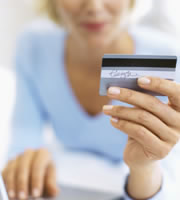10 ways to avoid being a victim of credit card crime

Whether you have one credit card or 15, you may be a target for credit card fraud. Though there’s no such thing as total security, you can take some simple steps to help protect yourself from these schemes.
Don’t be a victim. Instead, use your common sense, and follow these 10 tips for safe credit card use.
1. Credit cards–keep yours in sight
“Skimmers” are tiny devices (about the size of a pager) that allow criminals to copy the information on your credit card’s magnetic strip. It takes only a couple of seconds to swipe a card through one of these, after which a thief can clone your card onto counterfeit plastic or use your account online.
To minimize risk of this kind of theft, don’t let a waiter or store clerk take your card away for processing, and don’t let him or her mess with it under a counter. In other words, keep it in sight at all times.
2. Avoid dodgy ATMs and vending machines
Some skimmers are adapted to fit into the slots where you insert your credit card in the front of ATMs, gas pumps and vending machines. If you notice anything unusual about one of these slots, avoid using the machine.
3. Sheath your NFC credit cards
If you have near field communications (NFC) credit cards that you can wave near a terminal to make payments, then those cards are constantly transmitting your card details. Thieves can carry handheld devices that could capture the information while you’re walking down the street.
Many credit card companies provide a sheath for an NFC card that blocks these transmissions. If you have one, use it. If you don’t, get one.
4. Credit card use online–beware
The FBI advises avoiding credit card use online unless you know the website is “secure and reputable.” Check out the site’s owner with the Better Business Bureau in its area, and only provide card details if the website address (URL) begins with “https://” It’s the “s” in there that’s important.
5. Protect your PIN
Consumer Reports says: “When typing your PIN into an ATM or card reader, use your free hand to shield the keypad from the view of hidden cameras or anyone nearby.” And never write your PIN on or near your card. (Also, look before you cross the road, don’t leave your keys in your car and don’t let toddlers play with loaded guns. Some of this is just common sense!)
6. Monitor your credit report
If you constantly keep an eye on your credit report, you’re more likely to be able to head off identity theft before it becomes too serious. More frequent or extensive reporting can cost some money, but it could prove a good investment.
You’re entitled to a free credit report on the Federal Trade Commission (FTC)-authorized site annualcreditreport.com. If you want more monitoring, check out services such as Equifax Credit Watch Gold with Score Power and TransUnion–Three Bureau Credit Monitoring.
7. Consider single-use credit cards
Single-use credit cards provide multiple credit card numbers for a single account. You can generally assign a different number to each merchant from whom you regularly buy and impose a limit on the amount that can be charged to each number.
These were pioneered by American Express and Discover, but other credit card companies now offer them.
8. Empty your mail box
If you’re one of those people who sometimes leave their mail in their box overnight, get into the habit of emptying it as soon after a delivery as you can. All too often, thieves steal credit cards or credit card account information from mailboxes.
9. Sign your credit cards as soon as they arrive
This is another obvious tip, but it’s surprising how many people put off signing their new and replacement cards. In fact, it heads the FTC’s list of dos and don’ts for avoiding credit card fraud.
10. Dispose of paperwork carefully
The FTC also suggests that you dispose of all credit card paperwork carefully. Anything with your card details on poses a risk and should be shredded.
Disclaimer:The information in this article is believed to be accurate as of the date it was written. Please keep in mind that credit card offers change frequently. Therefore, we cannot guarantee the accuracy of the information in this article. Reasonable efforts are made to maintain accurate information. See the online credit card application for full terms and conditions on offers and rewards. Please verify all terms and conditions of any credit card prior to applying.
This content is not provided by any company mentioned in this article. Any opinions, analyses, reviews or recommendations expressed here are those of the author’s alone, and have not been reviewed, approved or otherwise endorsed by any such company. CardRatings.com does not review every company or every offer available on the market.
Published